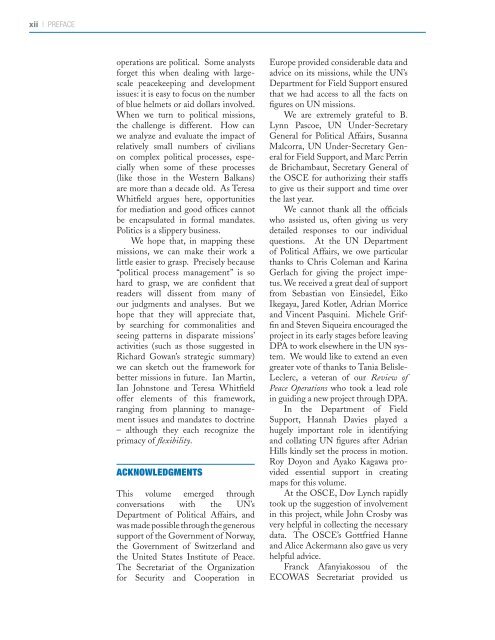here - Center on International Cooperation - New York University
here - Center on International Cooperation - New York University
here - Center on International Cooperation - New York University
You also want an ePaper? Increase the reach of your titles
YUMPU automatically turns print PDFs into web optimized ePapers that Google loves.
xii | Prefaceoperati<strong>on</strong>s are political. Some analystsforget this when dealing with largescalepeacekeeping and developmentissues: it is easy to focus <strong>on</strong> the numberof blue helmets or aid dollars involved.When we turn to political missi<strong>on</strong>s,the challenge is different. How canwe analyze and evaluate the impact ofrelatively small numbers of civilians<strong>on</strong> complex political processes, especiallywhen some of these processes(like those in the Western Balkans)are more than a decade old. As TeresaWhitfield argues <str<strong>on</strong>g>here</str<strong>on</strong>g>, opportunitiesfor mediati<strong>on</strong> and good offices cannotbe encapsulated in formal mandates.Politics is a slippery business.We hope that, in mapping thesemissi<strong>on</strong>s, we can make their work alittle easier to grasp. Precisely because“political process management” is sohard to grasp, we are c<strong>on</strong>fident thatreaders will dissent from many ofour judgments and analyses. But wehope that they will appreciate that,by searching for comm<strong>on</strong>alities andseeing patterns in disparate missi<strong>on</strong>s’activities (such as those suggested inRichard Gowan’s strategic summary)we can sketch out the framework forbetter missi<strong>on</strong>s in future. Ian Martin,Ian Johnst<strong>on</strong>e and Teresa Whitfieldoffer elements of this framework,ranging from planning to managementissues and mandates to doctrine– although they each recognize theprimacy of flexibility.AcknowledgmentsThis volume emerged throughc<strong>on</strong>versati<strong>on</strong>s with the UN’sDepartment of Political Affairs, andwas made possible through the generoussupport of the Government of Norway,the Government of Switzerland andthe United States Institute of Peace.The Secretariat of the Organizati<strong>on</strong>for Security and Cooperati<strong>on</strong> inEurope provided c<strong>on</strong>siderable data andadvice <strong>on</strong> its missi<strong>on</strong>s, while the UN’sDepartment for Field Support ensuredthat we had access to all the facts <strong>on</strong>figures <strong>on</strong> UN missi<strong>on</strong>s.We are extremely grateful to B.Lynn Pascoe, UN Under-SecretaryGeneral for Political Affairs, SusannaMalcorra, UN Under-Secretary Generalfor Field Support, and Marc Perrinde Brichambaut, Secretary General ofthe OSCE for authorizing their staffsto give us their support and time overthe last year.We cannot thank all the officialswho assisted us, often giving us verydetailed resp<strong>on</strong>ses to our individualquesti<strong>on</strong>s. At the UN Departmentof Political Affairs, we owe particularthanks to Chris Coleman and KarinaGerlach for giving the project impetus.We received a great deal of supportfrom Sebastian v<strong>on</strong> Einsiedel, EikoIkegaya, Jared Kotler, Adrian Morriceand Vincent Pasquini. Michele Griffinand Steven Siqueira encouraged theproject in its early stages before leavingDPA to work elsew<str<strong>on</strong>g>here</str<strong>on</strong>g> in the UN system.We would like to extend an evengreater vote of thanks to Tania Belisle-Leclerc, a veteran of our Review ofPeace Operati<strong>on</strong>s who took a lead rolein guiding a new project through DPA.In the Department of FieldSupport, Hannah Davies played ahugely important role in identifyingand collating UN figures after AdrianHills kindly set the process in moti<strong>on</strong>.Roy Doy<strong>on</strong> and Ayako Kagawa providedessential support in creatingmaps for this volume.At the OSCE, Dov Lynch rapidlytook up the suggesti<strong>on</strong> of involvementin this project, while John Crosby wasvery helpful in collecting the necessarydata. The OSCE’s Gottfried Hanneand Alice Ackermann also gave us veryhelpful advice.Franck Afanyiakossou of theECOWAS Secretariat provided us
















